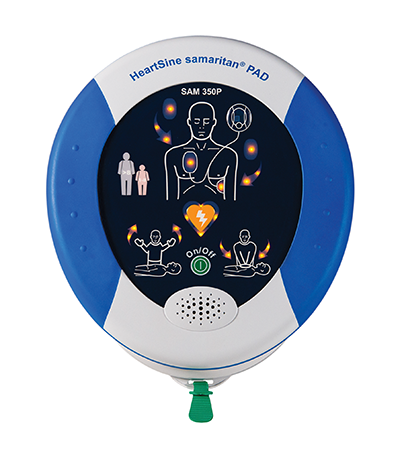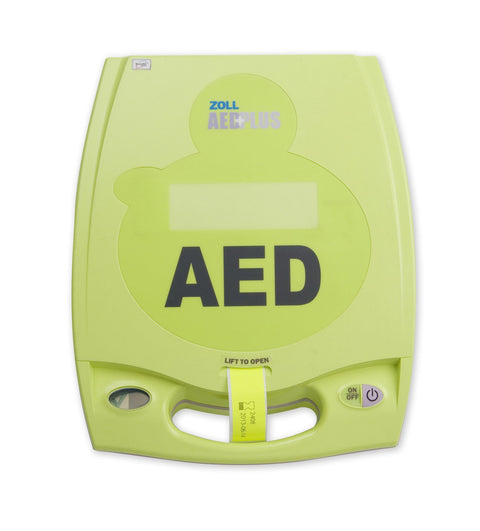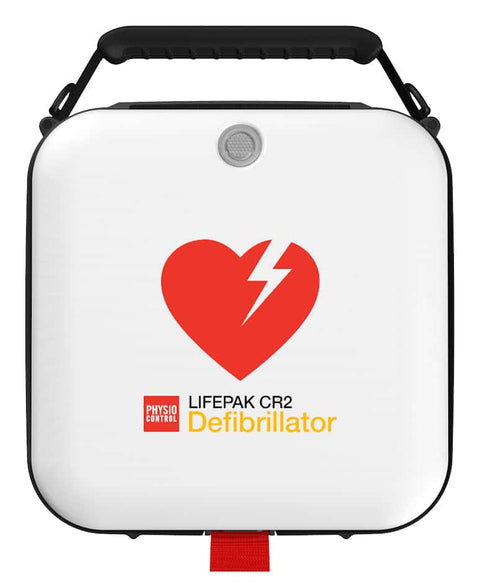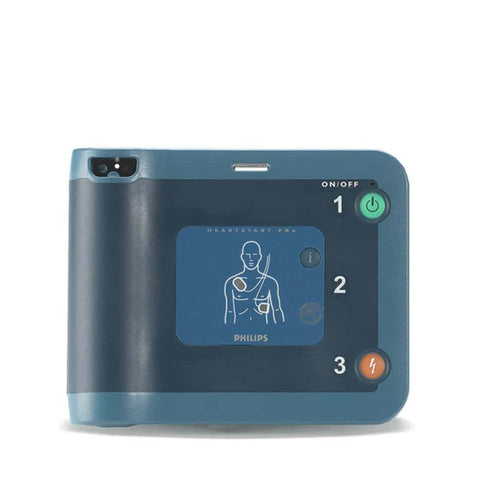Sudden Cardiac Arrest (SCA) can strike anyone, anywhere, without warning—even seemingly healthy adults and young children. This is why AEDs are increasingly becoming a staple in public spaces, including offices and businesses. In fact, 48,000 of SCAs happen in a public setting, and around 10,000 SCAs occur in the workplace in the United States each year.
Business owners must be prepared for the possibility of an employee or visitor collapsing due to sudden cardiac arrest (SCA) and ensure they have the necessary equipment to save a life.
AEDs have been approved around the world for over three decades. It is believed they have saved 3 million lives.
Imagine a client visiting your office for an important meeting. Or a patron buying something from your store. Suddenly, in the middle of a conversation, they collapse from an apparent cardiac arrest. In such a critical moment, every second counts.
With an AED on hand, your team can act immediately, administering a shock that could help restart the client’s heart before emergency responders arrive. This immediate response capability ensures your workplace or establishment is prepared to handle SCAs and save lives.
Reasons to Buy an AED for Your Office or Business
Investing in an AED for your office or business isn’t just a smart move—it’s a lifesaving one. Here’s why your business should consider investing in an AED:
Enhanced Safety and Preparedness
Having an AED readily accessible equips your team with the tools needed to respond immediately to a cardiac emergency, whether it be an employee or a visiting guest. You won’t have to wait for those long minutes it takes for an ambulance to come, which could be the difference between life and death for someone.
Employee Safety
Employees appreciate knowing that their employer prioritizes their health and safety. Installing an AED signals your commitment to creating a safe workplace. This is especially true if you have older workers (60+) working at your establishment. They are at higher risk, and it can cultivate peace of mind that you have the equipment if anything happens.
Compliance with Regulations
In some regions, businesses are required by law to have AEDs available. Even if it’s not a legal requirement in your area, having an AED demonstrates proactive compliance with best practice standards
Stressful Environment
If your work environment is high-stress, your employees could be at a greater risk of a student cardiac event. The presence of an AED can add an extra layer of protection in the event that a stressful scenario triggers an SCA.
Every year, there are 10,000 sudden cardiac arrests (SCAs) in workplaces across the United States. Having an AED on-site can be the difference between life and death for your coworker, friend, or family member.
AED Laws and Requirements for Businesses
Unfortunately, there is no national law requiring employers or businesses to purchase and have an AED on-site. However, to promote the purchase of AEDs and save lives, all 50 states have enacted “Good Samaritan” laws that provide civil liability protection for individuals who buy or use these devices
All states have legislation which provides immunity protection and establishes requirements for automated external defibrillators. It states that “A person who uses a defibrillator at the scene of an emergency and all other persons and entities providing services under this section are immune from civil liability for any personal injury that results from any act or omission in the use of the defibrillator in an emergency setting.”
So, if you're concerned about having an AED but unsure how to use it effectively in an emergency, there's no need to worry. You are protected by law. Additionally, you can always enroll in training programs offered by local hospitals, fire departments, or the American Heart Association (AHA) to gain the skills and confidence needed to respond in the event of Sudden Cardiac Arrest.
How to Get an AED For Your Business or Workplace
Acquiring an AED is a straightforward process when you partner with a reliable supplier like AED First Response. Here’s a step-by-step guide to getting started:
1. Assess Your Needs
Begin by assessing your workplace’s specific needs. Consider factors such as the size of your workforce, the layout of your office, and the number of devices required to provide adequate coverage. The American Heart Association recommends having an AED within a 1-2 minute response time from any location in the building.
2. Research Options and Features
With various AED models available, it’s essential to choose one that fits your needs. Consider factors like ease of use, cost, design, warranty, and additional features. AED First Response offers a range of options and expert guidance to help you make an informed decision.
3. Budget Considerations
The average cost of an AED (Automated External Defibrillator) typically ranges from $1,200 to $2,500, depending on the make and model. When considering the purchase of an AED, it's essential to determine a budget that fits within your business expenses. Additionally, keep in mind that there may be extra costs associated with training employees on how to use the device, as well as replacement parts such as batteries and electrode pads. AEDs are extremely low-maintenance and have long battery lives of 4 years.
Hear Reviews From AED First Response Clients
Your timely and informative responses convinced me that I should purchase from AED First Response. Customer Service usually gets a bad rap these days but you have proven that there are still great people in the business
Alan D.
FAQs About AEDs in The Workplace
We’ve compiled answers to some frequently asked questions about AEDs in the workplace:
Are AEDs required in businesses?
No, there is no federal law requiring businesses or workspaces to have AEDs. However, all 50 states have "Good Samaritan" laws that protect individuals from civil liability when they buy or use AEDs.
Why should businesses and offices have AEDs?
Simply put, to save lives. Each year, approximately 10,000 sudden cardiac arrests (SCAs) occur in workplaces throughout the United States. Having an AED available on-site can mean the difference between life and death for your coworkers, friends, or family members.
How many AEDs should a business or office have?
The American Heart Association recommends having an AED within a 1-2 minute response time from any location in the building.
How often do AEDs need to be checked?
Although every state has Good Samaritan Laws that protect both the user and the owner when an AED is used, many of these laws stipulate that the AED must be maintained according to the manufacturer's guidelines. It is important to designate someone responsible for conducting AED visual checks at least once a month, and these checks should be documented.
How many times can an AED be used?
A defibrillator can be used indefinitely. However, it is crucial to always replace the electrode pads and the battery when necessary. Check your model's requirements for when the electrode pads and battery need to be replaced. Customers often keep AEDs for 15 to 20 years.
How do I get an AED for my business?
Contact AED First Response today at 888.462.9502 or email customerservice@aedfirstresponse.com to find the best AED for your business or workplace.
Reach out to AED First Response To Secure an AED for Your Business or Workplace Today
Contact AED First Response at 888.462.9502 or email customerservice@aedfirstresponse.com to find the ideal AED for your workplace. Our team is dedicated to guiding you through every step of the process, helping you choose the best option to meet your needs. With AED First Response, you can expect a smooth, professional, and friendly experience from a team committed to ensuring the safety of your employees and visitors.








